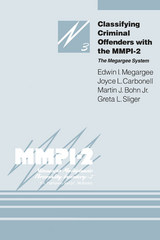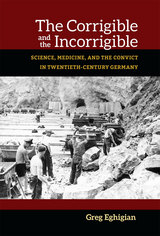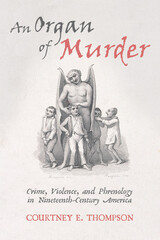4 books about Criminal psychology

Classifying Criminal Offenders with the MMPI-2
The Megargee System
Edwin I. Megargee
University of Minnesota Press, 2001
An essential resource for employing this widely used personality assessment test in correctional settings.
Originally developed in the 1970s and now revised for the MMPI-2, the Megargee System provides a method for classifying criminal offenders into groups based on their MMPI-2 profiles. This empirically derived system has been investigated in a wide variety of criminal justice settings including corrections, probation, and parole. It has been tested in minimum, medium, and maximum federal, state, and military correctional institutions, in local jails, in halfway houses, and in forensic mental health units. Its use has been extended to female offenders, older men, and juvenile delinquents. Integrating thirty years of research, this new resource fully evaluates the reliability, validity, sources, and uses of the Megargee system.
Classifying Criminal Offenders with the MMPI-2 describes how the system was originally derived and validated and gives instructions on how to classify the original MMPI and MMPI-2 profiles of male and female criminal offenders. It integrates the findings of more than one hundred independent studies with previously unpublished original research investigating the characteristics of each of the system's empirically derived male and female types. On the basis of these data, the authors recommend the optimal settings, change agents, and treatment programs for each type of offender.
As the basic reference work on the MMPI-2 Megargee system, this volume will be an essential resource for criminal justice practitioners, psychologists interested in the MMPI-2, and researchers in criminal classification and personality assessment.
Edwin I. Megargee is professor of psychology at Florida State University and recognized as the foremost expert on the use of the MMPI instruments in correctional settings. Joyce L. Carbonell is professor of psychology at Florida State University. Martin J. Bohn Jr. is chief psychologist at Florida State Hospital. Greta L. Sliger is a clinical psychologist in Tallahassee, Florida.
[more]

The Corrigible and the Incorrigible
Science, Medicine, and the Convict in Twentieth-Century Germany
Greg Eghigian
University of Michigan Press, 2015
The Corrigible and the Incorrigible explores the surprising history of efforts aimed at rehabilitating convicts in 20th-century Germany, efforts founded not out of an unbridled optimism about the capacity of people to change, but arising from a chronic anxiety about the potential threats posed by others. Since the 1970s, criminal justice systems on both sides of the Atlantic have increasingly emphasized security, surveillance, and atonement, an approach that contrasts with earlier efforts aimed at scientifically understanding, therapeutically correcting, and socially reintegrating convicts. And while a distinction is often drawn between American and European ways of punishment, the contrast reinforces the longstanding impression that modern punishment has played out as a choice between punitive retribution and correctional rehabilitation. Focusing on developments in Nazi, East, and West Germany, The Corrigible and the Incorrigible shows that rehabilitation was considered an extension of, rather than a counterweight to, the hardline emphasis on punishment and security by providing the means to divide those incarcerated into those capable of reform and the irredeemable.
[more]

Erich Fromm and Critical Criminology
BEYOND THE PUNITIVE SOCIETY
Edited by Kevin Anderson and Richard Quinney
University of Illinois Press, 2000

An Organ of Murder
Crime, Violence, and Phrenology in Nineteenth-Century America
Courtney E. Thompson
Rutgers University Press, 2021
Finalist for the 2022 Cheiron Book Prize
An Organ of Murder explores the origins of both popular and elite theories of criminality in the nineteenth-century United States, focusing in particular on the influence of phrenology. In the United States, phrenology shaped the production of medico-legal knowledge around crime, the treatment of the criminal within prisons and in public discourse, and sociocultural expectations about the causes of crime. The criminal was phrenology’s ideal research and demonstration subject, and the courtroom and the prison were essential spaces for the staging of scientific expertise. In particular, phrenology constructed ways of looking as well as a language for identifying, understanding, and analyzing criminals and their actions. This work traces the long-lasting influence of phrenological visual culture and language in American culture, law, and medicine, as well as the practical uses of phrenology in courts, prisons, and daily life.
An Organ of Murder explores the origins of both popular and elite theories of criminality in the nineteenth-century United States, focusing in particular on the influence of phrenology. In the United States, phrenology shaped the production of medico-legal knowledge around crime, the treatment of the criminal within prisons and in public discourse, and sociocultural expectations about the causes of crime. The criminal was phrenology’s ideal research and demonstration subject, and the courtroom and the prison were essential spaces for the staging of scientific expertise. In particular, phrenology constructed ways of looking as well as a language for identifying, understanding, and analyzing criminals and their actions. This work traces the long-lasting influence of phrenological visual culture and language in American culture, law, and medicine, as well as the practical uses of phrenology in courts, prisons, and daily life.
[more]
READERS
Browse our collection.
PUBLISHERS
See BiblioVault's publisher services.
STUDENT SERVICES
Files for college accessibility offices.
UChicago Accessibility Resources
home | accessibility | search | about | contact us
BiblioVault ® 2001 - 2024
The University of Chicago Press









